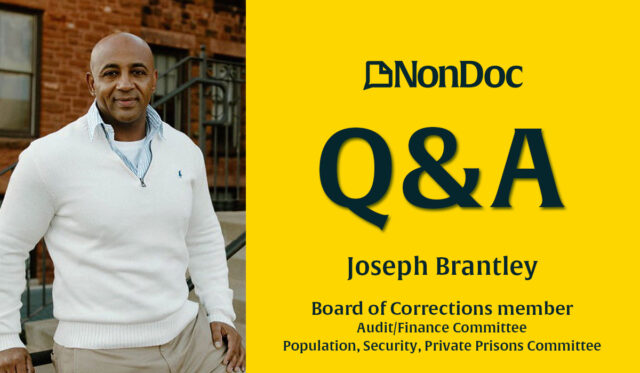
Gov. Kevin Stitt appointed Joseph Brantley to the state Board of Corrections, the governing body for the Oklahoma Department of Corrections, in March 2023. A formerly incarcerated person, Brantley now serves on the Audit/Finance Committee, as well as the Population, Security, and Private Prisons Committee.
Brantley became the board’s second member with experience as an incarcerated person. Beginning in the early 2010s, Brantley was incarcerated four times, with his longest sentence totaling 16 years for more than a dozen drug-related convictions.
Upon release, Brantley has dedicated himself to rebuilding relationships with family, embracing his Christian faith, and finding “second chances” in both his personal and professional life.
In 2021, Brantley secured that second chance after accepting a job offer from M-D Building Products and working as a setup technician before being hired full-time as a human resources training coordinator. Now, almost four years later, Brantley continues to work for the company as a talent acquisition specialist.
Brantley holds a bachelor’s degree from the University of Central Oklahoma where he is pursuing a masters in business administration. While continuing his studies, Brantley manages a sober living home and works with a number of nonprofits in Oklahoma City as an advocate for incarcerated and formerly incarcerated people.
In the following Q&A, Joseph Brantley shares his journey and discusses the impact he hopes to make in his role governing the state agency. Responses have been lightly edited for grammar and style.
Tell us about your journey from being incarcerated to serving on the Oklahoma Board of Corrections.
My journey from incarceration to serving on the Board of Corrections has been an absolute blessing, all by the grace of God. After serving a 16-year sentence for drug felony convictions, my life has completely changed. I now manage a sober living home and have benefited greatly from a structured environment with accountability. Through hard work and support, I’ve found employment with a company that believes in fair chance opportunities, pursued further education, gained my undergraduate and am now pursuing my MBA. I have become involved in advocacy for second chances with so many nonprofit groups here in Oklahoma City.
What kind of impact are you hoping to make as an appointed member of the Board of Corrections?
As a member of the board, I hope to make a significant impact by being a voice for Oklahoma citizens, taxpayers and those currently incarcerated. My goal is to inspire hope by being an example of what’s possible after incarceration and emphasizing the potential and skills of incarcerated individuals. I believe that by sharing my story and perspective, I can contribute to positive change within our correctional system.
About 20 percent of Oklahoma’s incarcerated population is being held in privately owned or leased prisons. What are your thoughts about privately owned and operated prisons? Do you have any concerns with the state of Oklahoma contracting with private prisons?
Regarding privately owned and operated prisons, I understand that only about 10 percent of our population is in private facilities, and the agency plans to end the use of private facilities by next summer. I trust the agency, director, leadership and governor’s decisions. I appreciate the transparency within the board, including how the director has established groups to discuss upcoming board meeting topics without forming a quorum. I have complete confidence in the agency’s intentions for both incarcerated individuals and Oklahoma citizens.
Earlier this summer, the GEO Group announced they would be ending their contract with DOC, which meant DOC was preparing to move inmates. Suddenly, at the June 26 Board of Corrections meeting, a revised contract was proposed and approved. When did you find out about the revised contract proposal with GEO Group, and did you have any concerns about how the negotiations were handled?
There’s a high level of transparency within our agency. While we were aware of the ongoing situation, we didn’t have the full depth of information that we later learned. I know there has to be a level of security and protection; especially as multiple options were proposed. There were implications and discussions about potential litigation.
As a board member, my role is to approve or not approve what has been meticulously prepared behind the scenes. I have complete confidence in our director and the agency’s leadership in developing the best-proposed contracts. When these reach us for approval, they’re typically so well-prepared that I feel comfortable voting in favor.
My trust in Director Steven Harpe and the agency is unwavering. I’ve never had any doubts or concerns about the agency’s actions. I trust them 100 percent to handle the behind-the-scenes work effectively. When it comes to transparency, we were aware of ongoing negotiations, and at that point, I trusted the agency implicitly. I believe in their leadership, integrity, honesty, commitment, vision and communication.
What do you think is the public’s biggest misconception of incarcerated people and prisons?
The biggest public misconception about incarcerated people is that they are incapable of change. From my experience, I know this isn’t true. The agency provides numerous opportunities for self-improvement, and it’s crucial to recognize people’s capacity for growth and transformation.
Do you have tips or advice for current rehabilitating offenders on how to prepare for life and work outside of prison?
For those currently incarcerated and working toward rehabilitation, my advice is to take full advantage of the time in prison. Focus on personal growth — build a relationship with God, set goals, and participate in available programs. Upon release, this is an opportunity to become a better person for your family and yourself.
If you could have one dinner with three historical figures, who would it be and why?
On a lighter note, if I could have dinner with three historical figures, I would choose the current Pope for his leadership in helping the incarcerated, Maya Angelou for her inspiring writings, and Dwayne Johnson for his work ethic and motivational attitude. Each individual embodies qualities that I believe are crucial for personal growth and positive societal change.






















